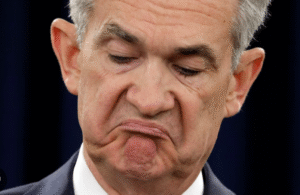$SPY $DXY $META
#USEconomy #Inflation #StockMarket #FederalReserve #InterestRates #GDPGrowth #MarketOutlook #Investing #EconomicForecast #HouthiConflict #Meta #TechStocks
The United States economy is expected to face slowing growth accompanied by a rise in inflation, raising concerns among investors and policymakers alike. Economists are increasingly forecasting a deceleration in GDP expansion due to tightening financial conditions, a fading boost from post-pandemic stimulus, and persistent geopolitical uncertainties. Inflation, which had shown signs of easing in recent months, is anticipated to regain momentum as labor markets remain resilient and supply chain disruptions, partly influenced by global conflicts, place continued pressure on prices. The Federal Reserve’s response to this evolving economic landscape will be pivotal, as interest rate cuts that were once widely expected in 2024 may now be delayed or moderated to avoid reigniting inflationary pressures. The US dollar index ($DXY), which tracks the currency’s strength against a basket of peers, could see fluctuations as markets adjust expectations for monetary policy shifts.
Stock markets have already begun to price in the potential slowdown, with the S&P 500 ($SPY) facing volatility as investors reassess corporate earnings growth in a weaker economic environment. While some sectors, such as technology, continue to exhibit strength driven by strong demand for artificial intelligence and cloud services, others, particularly in consumer discretionary and industrials, could see headwinds from declining consumer spending and higher costs. The broader implications of rising inflation amid slowing economic growth—often referred to as “stagflation”—could significantly impact market sentiment. Investors may turn to defensive assets such as gold, Treasury bonds, or even select commodities that tend to perform well in inflationary periods. The Federal Reserve’s delicate balancing act between fostering growth and containing inflation makes upcoming economic data, including CPI reports and job market indicators, critical for shaping market expectations.
Beyond domestic economic concerns, geopolitical risks continue to loom, notably the US’s campaign against Houthi rebels in the Red Sea. The ongoing military operations and disruptions to major shipping routes have amplified supply chain pressures, leading to increased costs for transportation and goods. Oil prices remain a key variable, as any escalation in hostilities could cause further volatility in energy markets, directly affecting inflation expectations and corporate profit margins. Supply-side shocks remain an unpredictable factor in the broader economic outlook, and energy-dependent industries, including airlines and manufacturing, may experience heightened cost pressures. Investors monitoring these geopolitical events are assessing the potential risks and positioning accordingly to hedge against uncertainties.
Meanwhile, in the corporate world, Meta Platforms ($META) continues to make strategic shifts that reflect broader societal and political currents. Under the influence of key executives and shareholders, the tech giant is subtly adjusting its stance to appeal to a more conservative user base while navigating regulatory scrutiny. The evolving direction of Meta’s policies and content moderation strategies could have implications for its advertising revenue and stock performance, as both users and investors react to these changes. With social media platforms playing an increasingly significant role in public discourse, Meta’s moves are being closely analyzed for their potential impact on user engagement and brand partnerships. As regulatory pressures and market dynamics shift, the company’s stock trajectory will likely remain tied to broader policy developments and consumer sentiment changes.











Comments are closed.